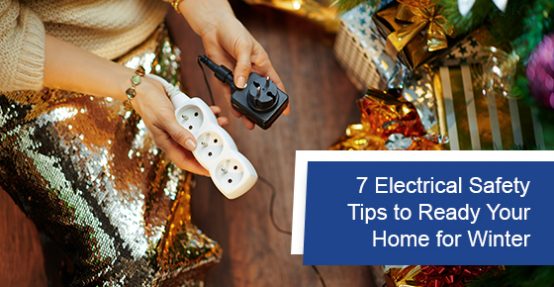
Fall is officially here, and it’s cool outside. That means the Canadian winter is right around the corner. Since winter brings on colder temperatures than most seasons, electricity usage in households naturally increases when there is limited sunshine and the days are shorter. With more people staying indoors during the winter season, there is an uptick of lights, computers, gadgets, and television entertainment consoles that are being used, which in turn increase the risks that are linked to electrical surges.
Homeowners should remain extra vigilant during winter, especially when severe weather occurs. Ice storms and snowstorms can cause power outages due to fluctuations of strong winds and a combination of ice, rain, and snow.
Therefore, being prepared is the key to keeping you and your family safe from winter electrical issues in your home. Here at Hi-Lite Electric, we would like to help, so we’ve rounded up 7 electrical safety tips to get your home ready for winter.
Most winter electrical issues are due to old electrical outlets. The older your house gets, the more the electrical outlets naturally wear out over time. In some cases, if your house is getting older and you use electrical units with high-voltage appliances, they could spark and break out into a fire.
We advise you to check each electrical outlet in your home and replace the ones that are worn out. You should also replace the electrical outlets that will be most commonly used throughout the winter, such as those in the bedrooms and family room where people will be spending most of their time watching television or using their laptop.
Do a walk around in each room and check that all lamps and lighting fixtures are in working order. If their light bulbs flicker as you switch them on, then replace the bulbs. Make sure that each lamp and light fixture are compatible in terms of their individual wattage capacities. For example, some table lamps can only take 60-watt light bulbs. If you replace them with 100-watt light bulbs, they could burst and cause a fire.
If you use various light fixtures throughout your home, follow the maximum recommended bulb wattage for every fixture. If you don’t know each fixture’s maximum light bulb capacity, look up the brand and model online to check out their specs. Never go past the maximum wattage.
During the winter, many families congregate in the family room to watch movies on their home theatres or play games on tablets and phones. Sometimes, everyone is using one extension cord to plug in their devices to charge them up. This potentially could overload the single electrical socket and cause a fuse to burn out in the electrical box. Moreover, if you leave devices and appliances plugged into one extension cord for a long period, it can heat up the insulation in the cord, which could cause a fire.
To prevent the risk of an electrical fire, do not overload the extension cord and unplug each device when not in use. As well, opt for a heavy-duty extension cord and unplug it when no one is at home, or you’re about to go to bed.
Check if there is anything blocking your home’s main electrical panel. In case of a blackout, the area should be easy to access. Sometimes during severe winter storms, the power could fluctuate in your house and can trigger the switches off. In this case, you will have to manually turn them back on from the electrical panel.
Along with having easy access to your electrical panel, check to see that all the switches and circuits inside it are fully functioning. For easy reference, especially during a blackout, label every circuit by placing a sticker with the name of each room in the house, or use a label maker to identify the circuit.
If you have kids, be sure to childproof all electrical outlets with outlet shields. If you plan to run any extension cords under the carpets or area rugs, make sure you cover them with childproof caps.
If you’re planning on going away for a winter holiday during Christmas and New Year’s, be sure to unplug all non-essential devices such as lamps, home consoles, televisions, and kitchen appliances. Only leave the refrigerator plugged in. This way, you can enjoy your vacation without worrying that something could spark a fire.
If you would like a free quote on our emergency winter electrical services, our professional electricians at Hi-Lite Electric are here to assist you with preventing winter electrical issues in Toronto and the GTA. Call us in Toronto at 416-800-5523, in York Region at 289-207-0324, and in Peel Region at 289-216-0548, or contact us here.
© 2024 Licensed Electrical Installation & Service – Hi-Liteelectricinc.ca
All Rights Reserved.
Leave A Comment